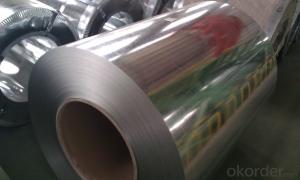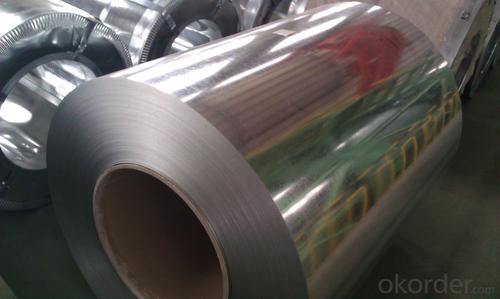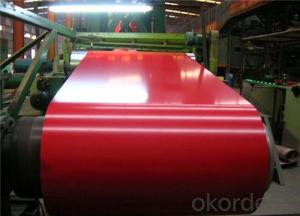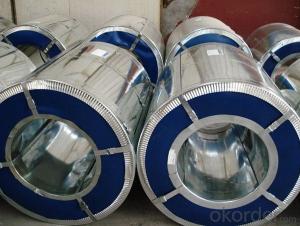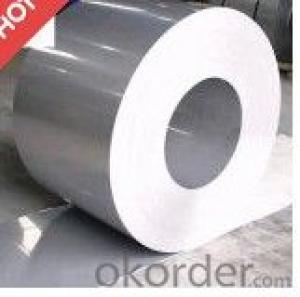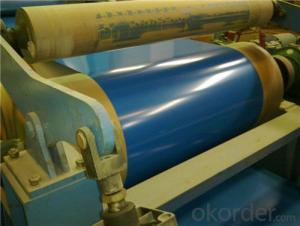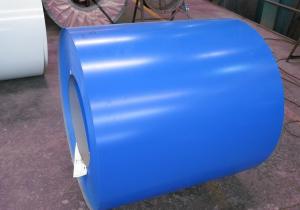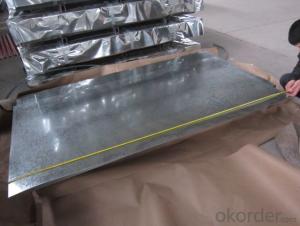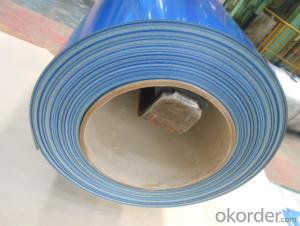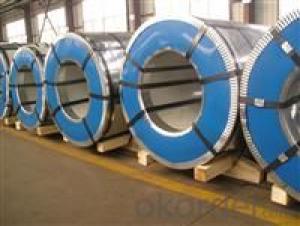Galvanized SteelCoil
- Loading Port:
- China Main Port
- Payment Terms:
- TT OR LC
- Min Order Qty:
- -
- Supply Capability:
- -
OKorder Service Pledge
OKorder Financial Service
You Might Also Like
Galvanized Steel Coil gets coated in layers of zinc because rust won't attack this protective metal. The most external layer is all zinc, but successive layers are a mixture of zinc and iron, with an interior of pure steel. These multiple layers are responsible for the amazing property of the metal to withstand corrosion-inducing circumstances. Zinc also protects the steel by acting as a "sacrificial layer." If rust does take hold on the surface of Galvanized Steel Coil, the zinc will get corroded first. This allows the zinc that is spread over the breach or scratch to prevent rust from reaching the steel. For countless outdoor, marine, or industrial applications, Galvanized Steel Coil is an essential fabrication component.
Appliances Industry Outer clad sheets for washing machine, refrigerator, television, air conditioner and ventilation system, explosion-proof strip, solar water heater and appliance parts
Auto Industry Muffler, heat shields of exhaust pipe and catalytic converter, auto parts & accessories under the frame, signboard in highway
Industrial Instruments Electric control cabinet, industrial refrigeration equipment, automatic vending machine
HOT DIP GALVANIZED STEEL COIL
STEEL GRADE & STANDARD:JIS G3302 SGCC
ZINC COATING MASS:Z12
SPANGLE:REGULAR SPANGLE
SURFACE TREATMENT:CHROMATED,UNOILED,NONSKINPASSED
THICKNESS:1.20MM
WIDTH:1200MM
COIL ID:508MM
COIL WEIGHT:4-7MT
WIDTH TOLERANCE:0/+5MM
- Q: Are steel coils resistant to rust and corrosion?
- Yes, steel coils are resistant to rust and corrosion. Steel coils are typically made from carbon steel or stainless steel, both of which have excellent corrosion resistance properties. Carbon steel coils are often coated with a protective layer, such as zinc or a polymer coating, to enhance their resistance to rust and corrosion. Stainless steel coils, on the other hand, are inherently corrosion-resistant due to the presence of chromium, which forms a protective oxide layer on the surface of the steel, preventing rust and corrosion. However, it is important to note that the level of resistance to rust and corrosion may also depend on the specific grade and quality of the steel used in the coils, as well as the environmental conditions they are exposed to.
- Q: What are the common methods of protecting steel coils from corrosion?
- There exist various techniques commonly employed for safeguarding steel coils against corrosion. 1. Coating: To establish a barrier between the steel coil and the corrosive environment, a protective coating can be expertly applied. Multiple types of coatings, including paint, epoxy, or zinc, are available, each possessing superb corrosion resistance and obstructing the ingress of moisture and oxygen onto the steel surface. 2. Hot-dip galvanizing: Immersing the steel coil in a bath of molten zinc constitutes the hot-dip galvanizing method, resulting in the formation of a substantial zinc coating. This zinc coating acts as a sacrificial barrier, effectively shielding the steel against corrosion. Hot-dip galvanizing is especially advantageous in harsh environments or when prolonged exposure to the outdoors is anticipated. 3. VCI (Volatile Corrosion Inhibitor) packaging: VCI packaging entails encasing the steel coils in specially designed film or paper laced with volatile corrosion inhibitors. These inhibitors vaporize and form a protective layer on the steel surface, effectively preventing corrosion. VCI packaging is commonly employed for short-term storage or transportation of steel coils. 4. Desiccants: Moisture plays a significant role in the corrosion process. Consequently, utilizing desiccants such as silica gel or activated alumina aids in moisture absorption and the maintenance of a dry environment surrounding the steel coils. Desiccants are often combined with other protective methods to enhance corrosion protection. 5. Appropriate handling and storage: Employing proper practices for handling and storage significantly mitigates the risk of corrosion. Steel coils should be stored in a dry environment, distanced from moisture sources. Additionally, clean gloves should be utilized during handling to prevent the transfer of corrosive contaminants. Regular inspection and maintenance of the storage area are crucial for identifying and addressing potential corrosion risks. By employing one or a combination of these methods, steel coils can be effectively preserved against corrosion, guaranteeing their longevity and structural integrity.
- Q: What are the challenges faced during steel coil processing?
- Some of the challenges faced during steel coil processing include ensuring proper alignment and feeding of the coils into the machinery, handling the heavy weight and size of the coils, managing the high temperatures involved in processing, preventing surface defects or damage to the steel, maintaining consistent quality throughout the process, and minimizing material waste and scrap.
- Q: How do steel coils contribute to strength and stability in structures?
- Steel coils contribute to strength and stability in structures due to their inherent properties. The coils are made of high-strength steel, which provides excellent tensile strength and resistance to deformation. When used in structural components such as beams, columns, or foundation systems, steel coils reinforce the structure and help distribute loads evenly, enhancing its overall strength and stability. The flexibility and durability of steel coils also enable structures to withstand external forces, such as wind or seismic loads, without significant deformation or failure.
- Q: How are steel coils used in the production of electrical equipment?
- Steel coils are used in the production of electrical equipment as they serve as the core component for transformers. The coils are made from high-quality steel to ensure efficient electrical conductivity and magnetic properties. They are wound around a core to create an electromagnetic field that helps in the transformation of voltage levels, enabling the smooth transmission and distribution of electricity.
- Q: What are the common problems faced during steel coil production?
- There are several common problems that can be encountered during steel coil production. One of the most common issues is coil breakage or damage. This can occur due to improper handling or transportation of the coils, which can lead to cracks or fractures. It is crucial to ensure proper handling procedures are followed to minimize the risk of coil breakage. Another common problem is coil slippage. This occurs when the coils are not securely stacked or stored, leading to them shifting or sliding. Coil slippage can result in damage to the coils and potentially cause accidents or injuries. Therefore, it is essential to have proper storage systems in place to prevent coil slippage. Additionally, coil corrosion is a common problem faced during steel coil production. Corrosion can occur due to exposure to moisture, air, or other corrosive substances. It can lead to the degradation of the steel, reducing its strength and durability. Implementing effective corrosion prevention measures, such as proper coating or storage techniques, is essential to mitigate this issue. Another challenge in steel coil production is coil quality issues. This can include inconsistent thickness, width, or surface defects on the coils. These quality problems can arise due to various factors, such as improper rolling processes, equipment malfunctions, or material defects. Regular quality checks and inspections should be conducted to identify and address any issues promptly. Moreover, coil handling and loading problems can also occur during steel coil production. Improper lifting or loading techniques can cause damage to the coils, leading to deformations or even accidents. It is crucial to train and educate employees on proper handling and loading procedures to prevent such problems. Overall, steel coil production can face various challenges, from coil breakage and slippage to corrosion and quality issues. Implementing proper handling, storage, and quality control measures is essential to minimize these problems and ensure the production of high-quality steel coils.
- Q: Can steel coils be coated with zinc-nickel alloy?
- Yes, steel coils can be coated with zinc-nickel alloy.
- Q: How are steel coils used in the production of industrial shelving?
- Steel coils are used in the production of industrial shelving by being processed and shaped into various components such as shelves, frames, and brackets. These coils are cut, bent, and welded to create sturdy and durable structures that can support heavy loads in industrial settings. The strength and versatility of steel make it an ideal material for manufacturing industrial shelving, ensuring durability and longevity of the shelves.
- Q: What are the advantages of using steel coils in various industries?
- There are several advantages of using steel coils in various industries. Firstly, steel coils are highly durable and have a high strength-to-weight ratio, making them suitable for heavy-duty applications. Secondly, steel coils offer excellent resistance to corrosion, which is crucial in industries exposed to harsh environments or chemicals. Additionally, steel coils can be easily formed and shaped, allowing for flexibility in design and customization. Lastly, steel coils are recyclable, making them an environmentally-friendly choice while reducing waste and promoting sustainability.
- Q: I have a set of steel pans with copper bottoms. When I cook with oil it always burns the oil to the pan and takes days to clean. I don't think I should use steel wool, since it might scratch the surface. Does anyone know a faster way to clean scorched oil off a steel pan?
- Get a can of Barkeeper's Friend. It's a powdered cleanser. It's gentle enough to be used on a ceramic cook top but still strong enough to get metal clean. Cheap and made from rhubarb leaves! Dampen the pan with water, sprinkle generously and smear around with a sponge with one of those non-stick safe nylon scrub pads. Wait about 10-15 minutes to let the product do some of the work for you. Come back and give it a good scrub. Reapply if necessary. I have all stainless steel cookware and use the Barkeeper's to keep them looking nice; especially since they are on display with my pot rack. I also have some copper pieces used for decoration and I use the Barkeeper's to keep them looking nice. It cleans them up faster and better than any of the homemade concoctions or metal cleaners without the residue. And I do use it on my ceramic cook top too! Be sure to wash and rinse the pan after you get it clean; it does leave a haze if you don't.
Send your message to us
Galvanized SteelCoil
- Loading Port:
- China Main Port
- Payment Terms:
- TT OR LC
- Min Order Qty:
- -
- Supply Capability:
- -
OKorder Service Pledge
OKorder Financial Service
Similar products
Hot products
Hot Searches
Related keywords
